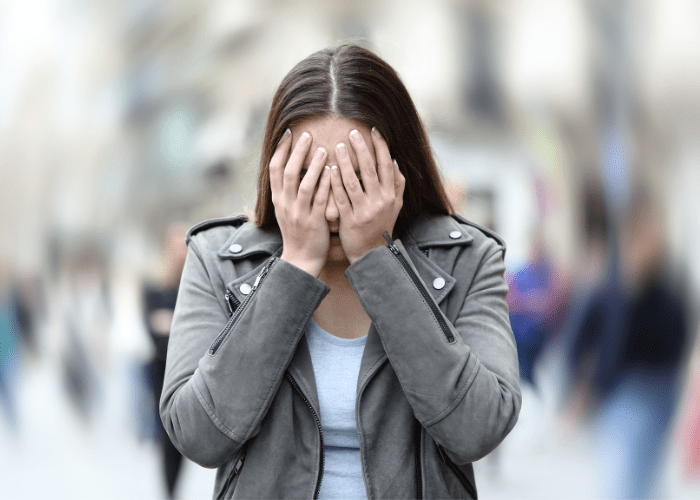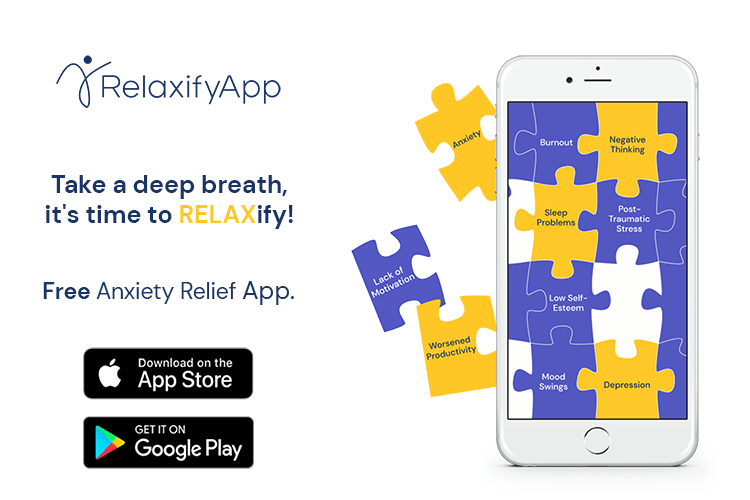How to Stop an Anxiety Attack?
In a SingleCare survey carried out in 2020, 62% of respondents declared that they have been experiencing some degree of anxiety. Meanwhile, the Anxiety and Depression Association of America estimates that 31% of all adults will suffer an anxiety disorder at some point in their life. Finally, a report by The World Health Organization points out that 264 million adults around the globe have persistent anxiety.
So, if you’ve been battling fear, nervous tension, and panic attack episodes, you’re far from alone in fighting this battle. In fact, you are sharing it with millions of people of all ages, genders, social statuses, and cultural backgrounds.
Today, we are giving a little background to the subject of anxiety — what triggers it, how to recognize it, and how to battle it according to science.
What Triggers Anxiety?
What we call by the common term “anxiety” actually falls into different groups and stages.
Generalized anxiety disorder (GAD) is the most common anxiety disorder, followed by panic disorder, phobia-related disorders, obsessive-compulsive disorder, and post-traumatic stress disorder. All of these conditions have to do with severe anxiety episodes that can reoccur for days, months, and even years.
Different forms of anxiety can have different reasons and genesis. According to psychologists, some of the most common triggers of anxiety are:
- Problematic experiences in childhood, adolescence, or adulthood;
- Physical or emotional abuse;
- Being neglected in your family or losing a parent;
- Bullying or being socially excluded;
- Having an underlying mental or physical condition;
- Substance abuse;
- Prolonged stress and exhaustion;
- Unhealthy home or working environment;
- Pressure, habitual burnout,
- Having a toxic spouse or family member, etc.
Or else said — difficult life circumstances can take their toll, and you can’t always expect to go through them fully untouched. Be it consciously or not, you will always have your triggers, and your reaction to them can vary from mild to severe, depending on different internal and external factors.
What are the First Signs of Anxiety?
It may be a cliche, but the fast-paced urban living itself presupposes a certain level of anxiety in our everyday lives. Noise pollution, unbalanced nutrition, and unnatural sleeping patterns are a very common set of prerequisites that trigger a purely physical reaction of being stressed, feeling tense, and having difficulties being your most balanced self. That’s why making a conscious effort to improve your mental health status is compulsory, and neglecting what your body tells you can quickly escalate into developing long-term anxiety.
There is a long list of red flags you should keep an eye on to recognize that things may have gone too far. And some of them include:
- Feeling weak, tired, and fatigued for prolonged periods;
- Feeling restless, tense, or nervous for no particular reason;
- Experiencing irritation, mood swings, or unexplainable bitterness;
- Having trouble with focus, concentration, and memory;
- Having persistent headaches or stomach problems;
- Feeling out of control with your emotions and reactions;
- Having troubles falling or staying asleep;
- Having an irrational feeling of danger or doom;
- Experiencing sudden hyperventilation or an increased heart rate;
- Having episodes of unexplainable sweating or trembling;
- Being too self-conscious and having low self-esteem;
- Feeling irrational guilt and damaged self-image, etc.
At first, you may ignore many of these symptoms as “accidental” or “normal.” However, the first step towards addressing the problem is recognizing that there is nothing normal in feeling down in your everyday life. So, if you’ve been neglecting the hints, it’s probably about time you face them and begin healing.
How Long Do Anxiety Attacks Last?
At some point, overlooked anxiety has the potential to quickly escalate into repetitive anxiety attacks. And these can seriously worsen your quality of life.
Anxiety attacks (also known as panic attacks) are sudden outbreaks of intense panic or fear. They can have a very specific trigger, or they can storm in straight out of the blue. But, no matter the cause, the result remains the same — a dreadful cocktail of emotional and physical symptoms.
During an anxiety attack, the dreadful fear is often accompanied by disorientation, shaking, dizziness, nausea, and an uncontrollable heart rate. Some people also report different and not-so-common manifestations such as mouth dryness, hot flashes, and shortness of breath.
An anxiety attack can last for a brief 10 minutes or up to half an hour. In addition, unnatural tension can build up long before the actual anxiety attack starts — sometimes days in a row. So once you get to know your way of experiencing anxiety attacks, you can take timely steps to prevent the actual crisis.
Is It Possible to Stop an Anxiety Attack?
Experts haven’t found a fully effective way to prevent or stop an anxiety attack midway through. Anyway, controlling the condition is not impossible if you make a conscious effort for both prevention and reaction to the situation.
We keep talking about prevention, as it is virtually your only long-term working solution. It might include professional therapy, a lifestyle change, working on your triggers, or all of them — systematically and thoughtfully.
If the anxiety attack happens to storm in anyway, there are still things you can do to relieve its symptoms and shorten its duration. Learning how to stop anxiety muscle twitching or how to stop anxiety nausea might be challenging, but it pays off.
What are 5 Ways to Calm Down an Anxiety Attack?
Experts recommend different steps for calming down an anxiety attack, depending on your triggers and your symptoms. Normally, getting personalized counseling is the best thing you can do to make sure you’re reacting accordingly.
Still, here is what helps during an anxiety attack for most people:
#1 Recognize What’s Happening
Anxiety attack symptoms can be scary enough to make you think your life is in actual danger. The pounding heart, sweating, shortness of breath, and throat tightness can literally make you believe you’re dying — making the episode even harder to cope with.
Once you know the symptoms, you can learn to recognize them. Once you recognize them, you can learn to understand that they will pass. Anxiety attacks are not life-threatening, although they might feel like such. So, repeating to yourself that this will pass and leave you untouched will always be your first and very best strategy.
#2 Practice Breathing Exercises
You might be tired of hearing to “calm down” and “breathe deeply.” But did you know that deep breathing gives your body signals that it is safe? The reason is purely physiological — your deepest, slowest, and most calmy rhythmic breathing occurs when you’re sleeping. Check out our RelaxifyApp Breathing Exercise.
Practicing breathing exercises is recommended both as a prevention technique and an SOS reaction during an anxiety attack. For example, you can try taking an at least 4-second-long deep breath, then keeping the air in for a few more seconds, and breathing it out slowly and steadily.
#3 Find a Grounding Technique
“Grounding” is not a term strictly reserved for astrologers and esoteric coaches. It literally means staying grounded in reality — a trick that has a lot to do with overcoming irrational episodes of dreading before something non-existent. Check out our RelaxifyApp Guided Body Scan Exercise.
There are plenty of grounding techniques you can try before you find the one that works for you. One of the most common ways to perform your reality check is to focus on a physical object and simply think of it. It can be a necklace, a stone, a leaf, a souvenir, or basically anything. The trick is to focus on its properties, think of its textures, its origins, its meaning, or whatever keeps your thoughts away from the faux menace you’re dealing with.
#4 Walk Away From Where You’re Standing
It’s not just about physically removing yourself from the place that potentially triggered you. It’s about the movement itself — the steady rhythm of your steps, the motion of your body, and the symbolic fact that you’re pushing forward.
As you walk, you can play a chosen mantra on repeat in your head. Repeating a phrase that has a deeper meaning for you can bring you back to your normal condition and help you out of an anxiety attack. It can be an affirmation, a spiritual saying you vibe with, or simply your favorite Star Wars quote. It doesn’t matter, as long as it works for you.
#5 Seek Counseling
If anxiety attacks hit too hard, last for too long, or take too much out of your pleasure in life, counseling might help you find a long-term solution for your difficulties. The underlying reasons for anxiety and panic disorders are successfully addressed with cognitive-behavioral therapy, and your therapist can also recommend a supplementary medical treatment to support the process safely.
At the end of the process, you will have learned not only how to stop an anxiety attack at night or at your workplace. You will know how to prevent the anxiety attack from happening at all — by doing the shadow work needed to overcome what got you there in the first place.
Say goodbye to automatic negative thoughts with your daily exercises in RelaxifyApp! 👋


